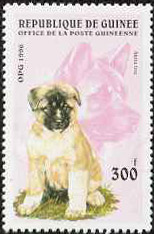
Efficacy of the treatment of dogs with leishmaniosis with a combination of metronidazole and spiramycin
Spiramycin and metronidazole combination can offer a useful second-line treatment for dogs with leishmaniosis
source: M.G. Pennisi, M. de Majo, M. MAsucci,
D. Britti, F. Vitale and R. del Maso
Veterinary Record vol 156 no 11,
March 12 2005 starts p346, 4 pages long
Vets can achieve a clinical cure for leishmaniosis infantum with available drugs, but not a parasitological cure. Some drugs, such as those containing antimony, are expensive and have side-effects. A spiramycin and metronidazole combination has already been successfully used with some dogs not responding to conventional treatments or relapsing, and is inexpensive and can be given orally. This study involved a total of 27 dogs infected with leishmaniosis infantum, and treated for 90 days.
The control group comprised 14 dogs treated with allopurinol and meglumine antimonate, a conventional treatment, while 13 comprised a test group and were treated with spiramycin and metronidazole. The mean age for dogs in the test group was 3.5 years, and there were two females and 12 males. The mean age for dogs in the test group was 3.8 years, and there were three females and 10 males. A side effect of raised amylase levels was noted in eight control dogs and four test dogs. Four dogs in the control group suffered side effects so severe that they were withdrawn. Eight of the remaining 10 showed a clinical improvement, while two deteriorated. One dog from the test group developed pemphigus foliaceus and was withdrawn. Ten of the remaining twelve showed a clinical improvement, and two deteriorated.
The improvement was noted faster in the control group, after an average of 30 days, compared with 45 days for the test group. No dog from either group was cured parasitologically. A spiramycin and metronidazole combination appears to be a useful second-line treatment for dogs with leishmaniosis
DO,HD


